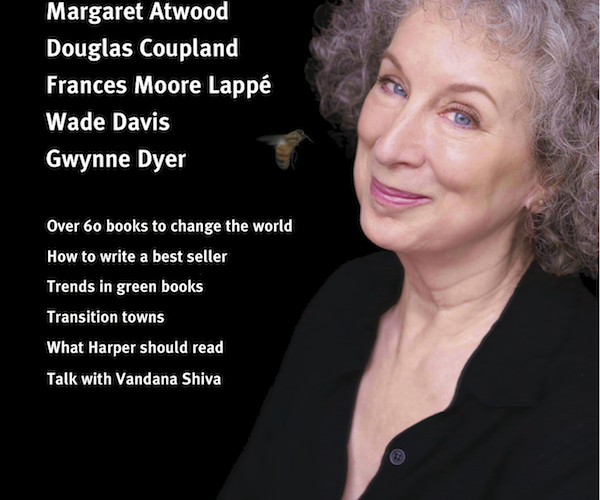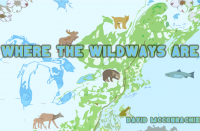Despite the Internet and the iPad, it’s hard to imagine that books will give way altogether. And as for environmental books, there are more than ever before on bookstore shelves. As Stephen Bocking points out in this issue of Alternatives, information is important, but stories are essential. That is exactly what books do best. They tell stories – often the complex ones that capture your full imagination.
With this issue, Alternatives celebrates the best in environmental reading, and helps you refine your summer reading lists.
Despite the Internet and the iPad, it’s hard to imagine that books will give way altogether. And as for environmental books, there are more than ever before on bookstore shelves. As Stephen Bocking points out in this issue of Alternatives, information is important, but stories are essential. That is exactly what books do best. They tell stories – often the complex ones that capture your full imagination.
With this issue, Alternatives celebrates the best in environmental reading, and helps you refine your summer reading lists.
 Read selected articles and web extras from this issue
Read selected articles and web extras from this issue
Here’s what else you get when you buy the issue:
2010 Trends: Build a Bigger Bookshelf
Eco-Intelligence – Marion Hoffmann
Find out the answers to our Environmental Crossword.
Letters to the Editor: 36.3
Science Friction
Stephen Bocking New novels by Atwood and Coupland allow readers to explore the future while confronting the present.
World Wars – Youri F. Cormier
New books by Gwynne Dyer and Cleo Paskal show us how climate change may fuel unprecedented military conflict.
The Forgotten Soldier Slinkachu
Year of the Flood Rakunks and liobams come alive in Evan Munday’s graphic interpretation of Atwood’s new novel.
Interview: The Water Softener -Kurtis Elton
David Brooks tells how the soft path strategy makes the most of the water we have.
In Review: Outrageous Oil – AClayton C. Ruby
“Tar Sands: Dirty Oil and the Future of a Continent” by Andrew Nikiforuk is reviewed by Clayton Ruby. Fort Chipewyan Doctor Unfairly Tarred Shawn Bell
In Review: Transition Towns – Leslie Wallace
“The Transition Handbook: From Oil Dependency to Local Resilience” by Rob Hopkins is reviewed by Leslie Wallace. Canada’s 13 Towns
In Review: Urban Renewal – Don Alexander
“Resilient Cities: Responding to Peak Oil and Climate Change” by Peter Newman, Timothy Beatley, and Heather Boyer is reviewed by Don Alexander.
In Review: A Farmer’s Lament – Elbert van Donkersgoed
“The War in the Country: How the Fight to Save Rural Life Will Shape Our Future” by Thomas E. Pawlick is reviewed by Elbert van Donkersgoed.
In Review: Inspiring Women – Heather MacAndrew
“Genius of Common Sense” by Glenna Lang and Marjory Wunch, and “Getting a Grip: Clarity, Creativity, and Courage in a World Gone Mad” by Frances Moore Lappé are both reviewed by Heather MacAndrew.
In Review: Some Like it Raw – Ellen Desjardins
“The Raw Milk Revolution: Behind America’s Emerging Battle Over Food Rights” by David E. Gumpert is reviewed by Ellen Desjardins.
In Review: Green Marx – Kurtis Elton
“The Ecological Revolution: Making Peace With the Planet” by John Bellamy Foster is reviewed by Kurtis Elton.
In Review: Bursting Bubbles – Mary Edwards
“Beyond the Bubble: Imagining a New Canadian Economy” by James Laxer is reviewed by Kyrke Gaudreau.
In Review: Awakening Wisdom – Heather MacAndrew
“The Wayfinders: Why Ancient Wisdom Matters in the Modern World” by Wade Davis is reviewed by Mary Edwards.
In Brief: 36.3
Short reviews of “Conservation Refugees”, “Climate Cover-Up”, “The Green Zone”, “Who Owns The Arctic?”, “Regreen: New Canadian Ecological Poetry”, “Ecoholic Home”, “Ecotechnic Future”, “Social Change 2.0”, and “The Bridge at the End of the World”.
The Last Word: Small Is Inevitable – Fraser Los
Publication of this issue was made possible by The Gosling Foundation; The Salamander Foundation; and the support from our many subscribers.
We acknowledge the financial support of Canada’s International Development Research Centre (www.idrc.ca); EJLB Foundation; Friends of the Greenbelt Foundation; The McLean Foundation; Ontario Media Development Corporation; Ontario Trillium Foundation; Ontario Work Study Plan. We acknowledge the financial support of the Government of Canada through the Canada Periodical Fund (CPF) of the Department of Canadian Heritage toward our project costs.
The support of the Faculty of Environment at the University of Waterloo and the Waterloo Environmental Studies Endowment Foundation is appreciated.’






 Read
Read 






